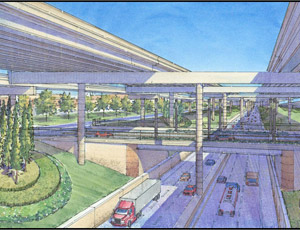Construction will start by spring 2011 on Dallas’ $2.7 billion LBJ Freeway (IH-635), one of the nation’s most congested highway systems. That couldn’t come sooner for Texans. The freeway carries about 270,000 vehicles daily with demand expected to exceed 450,000 by 2020.

The project developer, LBJ Infrastructure Group, is a public-private partnership led by Spanish firm Cintra, which has U.S. headquarters in Austin, and is the 51% owner of the project. Other companies in the partnership are Meridiam Infrastructure of New York, the Dallas Police and Fire Pension System; Houston-based W.W. Webber; and Spanish firm Ferrovial Agroman.
In September 2009, TxDOT executed a comprehensive development agreement (or CDA) with the LBJ Infrastructure Group (LBJIG) to design, construct, finance, operate and maintain the LBJ corridor in Dallas County.
On June 17, financing for the express project was secured. The partnership allows Texas to leverage its investment about five times, “without waiting for limited taxpayer resources to become available,” says Joe Aiello, CEO, Meridiam Infrastucture North America. Andy Rittler, director of corporate affairs, LBJ Infrastructure Group LLC, says that after 52 years road is handed back over t over to the state, “it will basically be able to write the project off. “That’s the estimate after construction, and adding in maintenance and operation, assuming current consumer price indexes and material costs don’t fluctuate beyond the norm,” he says.
Taxpayers will foot about $500 million of the project. Those dollars will be mostly absorbed by LBJIG, which will lease the roadways from the state over the next 52 years. The project will be constructed in five years with a 2016 targeted completion, and will be maintained and operated by LBJIG until 2061.
The $1.02-billion DFW Connector and the $2.5-billion North Tarrant Express, combined with the LBJ Express, all being built by private-public partnerships, are valued at more than $6 billion nand will occur simultaneously in the Dallas/Fort Worth Metroplex.
The LBJ project was already six months ahead of schedule with the finalizing of aesthetics and drainage among other items, Rittler says.
The project takes existing lanes and adds up to 13 mi of six new express-managed toll lanes within the existing footprint of the LBJ roadway.
Three of the managed lanes will be about 25 ft below the surface in some areas, Rittler says.
About 5.8 mi of existing roads will be improved, which is expected to nearly double capacity. When complete, motorists will have the option to remain on the free, general purpose lanes, or bypass congestion by using the tolled lanes, which are designed to keep traffic moving at a minimum of 50 mph. To maintain this speed, the Regional Transportation Council and the Texas Legislature implemented a scenario where the tolls would increase every 5 minutes to free up the congestion, Rittler says. Once the congestion subsides, the tolls drop back down to a lower rate.
Rittler says the state offers incentives to work in non-peak hours. The firm pays the state about $6,000 per hour to “rent” the roads during the off-peak times; and up to $32,000 per hour to build during rush-hour.
Rittler adds that each PPP is unique, but “we find that successful P3s often begin with a commitment from state and local leaders who are willing to seek innovative solutions to long standing traffic congestion issues.” Partnerships can transfer the risk from the public to the private sector, he says.


Post a comment to this article
Report Abusive Comment